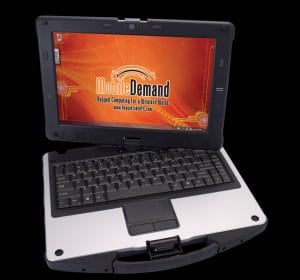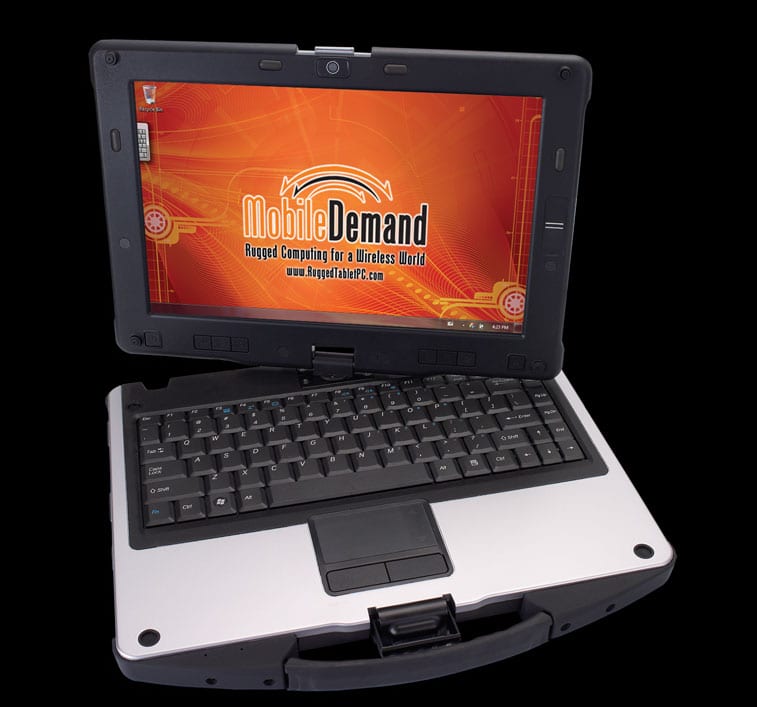 Russ Martin is a sales manager with MobileDemand, an Iowa-based provider of heavy-duty tablet PCs for business, with customers including Anheuser-Busch and NASCAR. Martin, and MobileDemand’s director of marketing, Maureen Szlemp, explain why, despite the mass popularity of the iPad and other tablets for business, some jobs still require beefier equipment.
Russ Martin is a sales manager with MobileDemand, an Iowa-based provider of heavy-duty tablet PCs for business, with customers including Anheuser-Busch and NASCAR. Martin, and MobileDemand’s director of marketing, Maureen Szlemp, explain why, despite the mass popularity of the iPad and other tablets for business, some jobs still require beefier equipment.
What do MobileDemand’s tablets offer that more consumer-friendly devices still don’t?
Martin: The iPad is a really nice device, and I actually give kudos to Apple for coming out with a full-screen tablet-type device because they raised interest within our customer base. But our customers aren’t traditionally white-collar workers like those who would be using the iPad. Our guys are gray-collar and blue-collar people who go out, jump into a truck and drive to a work site. And when they jump in the truck, they don’t just nicely put the tablet over on the seat next to them and strap it in. They’re throwing it in there.
With our devices, the big differentiator and the reason for the price difference is that we build ruggedness into it. In our market, the mobile computer traditionally had a quarter-screen VGA, usually running on a platform such as Windows Mobile or Windows CE. With the advent of the iPad, people are starting to say, “Hey! I like these full screens.” They’re not as enamored with the quarter-screen VGA anymore and they like the ability we have to bring in the full-screen display of the iPad along with the ruggedness that can survive the four-feet drops to concrete that you can traditionally get out of a handheld computer.
You have some particularly entertaining videos on your website that show just how rugged your computers are.
Martin: We have done some videos that are completely entertaining. Strap our tablet onto the top of an SUV and drive it through a car wash a couple of times. There’s another video where Steve Kunert, our VP of engineering, is dropping it from over his head and it hits the asphalt. Those things happen, where someone sets one of these on a pallet and it falls off. That actually happens all the time. That’s where the value of our tablets comes in. It sounds ridiculous, but you can use them in the shower if you want. You can go into any environment and you have a tool that’s going to help you do your job.
You take that tool to the point of work. Traditionally, if you had a handheld computer, you do minimal stuff with it at the point of work and then you go back and upload the information you’ve collected on your PC. By coming up with a full-screen tablet, we’ve taken away that two-step process. Data comes in and it can automatically be entered into the system.
Again, the iPad is great, but it’s not an enterprise-class device. If it falls out of your car, you get the Spiderman version when it shatters.
Szlemp: When it comes to total cost of ownership, it’s not just about the cost of the device itself. Sure you can buy three iPads for the cost of one of these really rugged devices, but you’re really only considering the cost of the device. When [an iPad] breaks out there on the job, you’ve lost the ability to do your work. So when a device fails on the job, you have to figure in all the productivity lost because your tool that you need to do your job is broken.
Martin: The second you have to pull out your pen and pad, you’re pretty much dead in the water for all intents and purposes. You don’t have any historical data. In field service, you need to have historical repair information on a device. Take HVAC for example – say these guys are going up to work on a condenser and they’d like to have that historical information but they don’t know that it’s been repaired three times. It really hurts them from a diagnostic standpoint.
Can you give any specific examples of situations where these consumer-grade tablets just won’t do?
Martin: One of our customers is very heavily involved in amusement parks and uses our tablets to do line monitoring as the lines get really long and their guests are coming into the turnstiles. In the past they had used an iPad-type device. The functionality was there on a nice, perfect February day with no humidity.
But they have kids doing the work and at the end of the day, they’re tossing them into a cart. The tablets were not surviving the environment. In the demo, everything looks nice and pretty but when these (consumer-grade) devices are out there facing the rigors of day-to-day use and a 16-year-old kid that could care less, they don’t do the job. In the middle of summer, it gets wet and screen goes out – boom. You’ve got a dead device.
They’ve tried putting covers on them, tried to do things like that and it just didn’t work out. In all honesty, [the iPad] is not an enterprise-class platform. It’s a consumer-grade, white collar platform.
So if you want a truly rugged device, you have to pay for it?
Russ: This is what I see: the IT people are the ones that really like the iPad. They’re thinking, “Man, our techs would love these things!” But when you put it in their hands, the techs look at them and go, “What the … ?” When you give an iPad to one of these techs, he’s afraid it’s going to shatter if he sneezes on it. I’ve seen the pushback from that and they’re not really super used to the multi-touch feature and all of the things iPad brings. I love the iPad myself. I think it’s a great tool, a sexy consumer-grade device but I see pushback from those guys who are used to the traditional clipboard.
I think there’s room for everyone on the boat. But when you’re a blue collar guy, you better have a device that if it falls out of your truck, it’ll survive just like your screwdriver will. Pick it up, dust if off. If you want to wash it off, you can wash it off. God forbid you do that with an iPad.
Szlemp: I think the iPad has created a resurgence of interest in the full screen tablet platform. I think it does manifest itself as. “Wow, this thing is so cool. I can think of all kinds of ways I can use it on my job.” That’s what people are trying. I think what they’re finding out really quickly is that if they’re out in the elements at all, the iPad is just not going to hold up. But conceptually and from a functionality standpoint, it gets them very excited because they can see there are a lot of possibilities with what they can do better and more efficiently with a tablet.
Who are some of your customers?
I’m working with a couple of pretty household names on route optimization for their delivery. We have a relationship with a company called PeopleNet that provides onboard computers for long haul truckers. PeopleNet has 96,000 licensed systems out there installed in 96,000 tractor trailers. They’ve just standardized with MobileDemand. They’re using our T7000, which is our seven-inch display minitablet, to track driver logs. In the cab of the tractor trailer, they have the T7000 mounted and tied into PeopleNet’s black box. That computer is logging all the driver’s information into the driver log, so if he gets pulled over by the Department of Transportation, he has all that information ready.
That information is also providing in-transit visibility. When the driver stops to make a drop during his haul, he can get out the tablet, which has a barcode scanner, scan the product off and use the touch screen’s signature capture to complete the transaction.
We also work with the government and military. Our 8.4-inch 8700 tablets are mounted in these million dollar minesweepers in Afghanistan and Iraq. The military is one of our biggest customers.
RailAmerica is another big customer of mine. They use our tablets to do in-transit visibility as well. The conductors use our tablets when they’re dropping of their rail cars very similar to the way truckers deliver packages.


Share this: